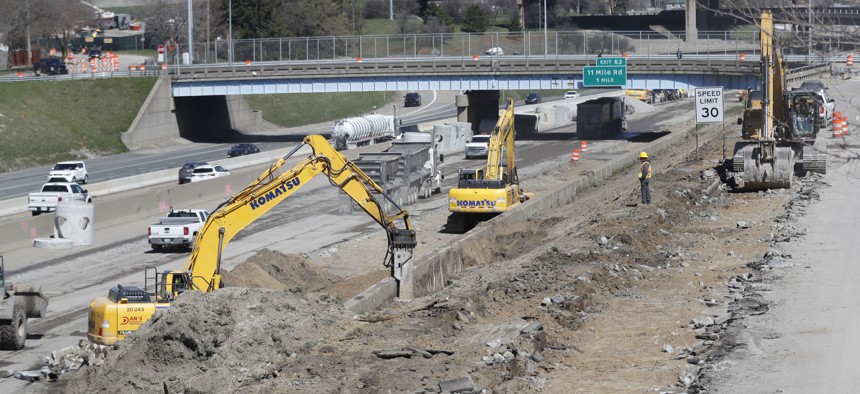Senate, House Push Transportation Bills to Help Coronavirus Recovery

Work continues on the Interstate Highway 75 project, Monday, April 20, 2020, in Hazel Park, Mich. AP Photo/Carlos Osorio

Connecting state and local government leaders
House Democrats introduced their own $500 billion transportation bill this week. Republicans said it does not include their funding priorities.
Republicans and Democrats in Congress are both pitching infrastructure funding as a mechanism that could help right the economy as the United States recovers from the coronavirus pandemic—the latest example coming this week with House Democrats introducing a $500 billion transportation bill.
The INVEST in America Act would allocate $83 billion in fiscal year 2021 for coronavirus recovery projects. It would create greater flexibility for the funding of transportation projects by not requiring state or local governments or transit agencies to match those grants, according to Democrats’ summary of the bill. It would also allow project sponsors to request that the federal share of Capital Investment Grants be increased to “account for lost local revenue sources due to Covid-19.”
Over five years, the bill would provide $319 billion for the federal aid highway program, $105 billion for Federal Transit Administration programs, and $60 billion for rail projects. The Democrats’ bill emphasizes public transit and environmental protections— increasing funding for public transit systems and requiring the Department of Transportation to establish a new greenhouse gas emissions performance measure. It would also prioritize projects that fix old infrastructure over building new bridges and roads.
“The INVEST in America Act is our opportunity to replace the outdated systems of the past with smarter, safer, more resilient infrastructure that fits the economy of the future, creates millions of jobs, supports American manufacturing, and restores U.S. competitiveness,” said Rep. Peter DeFazio, the Democratic chairman of the House Committee on Transportation and Infrastructure.
Additional environmental regulations and increased funding for public transit are sticking points for Republicans.
“As our nation grapples with the Covid-19 pandemic and continues to implement social distancing, it’s clear Americans will rely more on cars, roads and bridges and less on public transportation,” wrote Sen. John Barasso, the Republican chairman of the Senate Environment and Public Works Committee, in an op-ed this week.
Ridership on public transit has plummeted amid the coronavirus outbreak as more people work from home or try to avoid crowded transit. The House proposal is designed to help agencies weather that financial downturn.
The Senate Environment and Public Works Committee has approved three pieces of legislation that would address transportation and water infrastructure, including a $287 billion plan to fix and maintain highways and bridges across the United States.
“As our country begins to open back up, these bills will help get the American people and the American economy moving again,” Barrasso said. “They will provide an immediate boost by creating jobs, while providing the long-term benefit of efficiently moving goods and services across the country.”
Neither the House nor Senate proposals include a mechanism for funding, making it difficult to advance the legislation.
The House proposal also faces pushback from Republican lawmakers who said their priorities were not included in the bill.
Rep. Sam Graves, the ranking member on the Transportation and Infrastructure committee, and other members of the panel issued a statement that said the bill lacks flexibility for the states and focuses too much on funding in urban areas, to the detriment of rural America.
Testifying before the Senate public works committee on Thursday, Steve McGough, chairman of the American Road and Transportation Builders Association, emphasized the ability of transportation infrastructure activity to stimulate the economy.
“In 2019, public highway and bridge construction activity and related capital outlays alone generated nearly $400 billion in economic activity across all sectors of the economy, and 2.8 million jobs were supported or created,” he said.
Andrea Noble is a staff correspondent with Route Fifty.

NEXT STORY: DOD unwraps 7 more 5G testing sites




